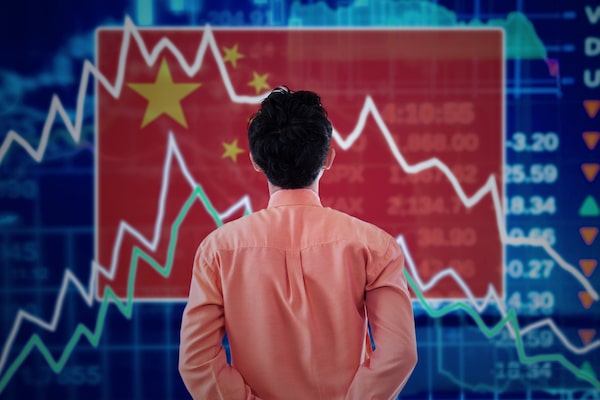
The question among investors is whether last week’s rough patch in China’s markets, amplified by a crackdown from Beijing on profits made by education companies, could infect the rest of the system.CreativaImages/iStockPhoto / Getty Images
Whatever the shock to markets, equity investors have a strong impulse: buy the dip. The latest ructions relating to China’s apparently poorly anticipated crackdown on foreign-listed shares could test this reflex.
The buy-the-dip muscle memory is strong. One after the other, potential hits this year have proven to be passing hiccups. An explosion of retail trading fervour at the start of 2021 provided lively entertainment and posed some tough questions around the everyday punter’s access to public markets. However, it left the rest of the investor community largely unscathed.
The fierce pullback in the U.S. government bond market in the first quarter failed to have a lasting impact on equity investors’ enthusiasm. The implosion of the Archegos family office, complete with multibillion-dollar hits to a clutch of investment banks, stayed in its lane. And more recently, the wobble attributed – rightly or wrongly – to the Delta variant of coronavirus faded the following day. They just don’t make proper market shocks like they used to.
Bank of America has done some interesting number crunching on this. The Delta mini-shock on July 19 was, the bank says, a two-sigma event – a big departure from the norm, for those of a less mathematical persuasion.
Looking at other one-day shocks of a similar magnitude to the S&P 500 so far this year, the average recovery time is just around 2.6 days, the bank said. That’s around the fastest recovery pace since 1928.
Persistent central bank largesse “continues to incentivize investors to compete for ‘dip-alpha’” – excess returns from leaping into declines – the bank added.
Now, the question is whether last week’s rough patch in China’s markets, amplified by a crackdown from Beijing on profits made by education companies, could infect the rest of the system; and if it does, whether it’s treated as another dip to buy.
China’s market shock is so far not on the scale of the last really severe shake-out in 2015. But consecutive days of declines in China’s CSI 300 index of more than 3 per cent is not to be sniffed at. Chinese tech stocks have suffered their worst month since the global financial crisis of 2008.
Morgan Stanley warned clients not to try and catch a falling knife in Chinese equities: “We reiterate: no bottom-fishing yet.”
U.S. tech stocks have caught the bug, albeit relatively mildly. In a more severe sell-off, though, might Germany’s Dax be at risk? The fortunes of the German industrial sector are, after all, closely tied to demand from China.
César Pérez Ruiz, chief investment officer at Pictet Wealth Management, is on the worried side. Some exposure to China still makes sense, he says, but overseas investors must be careful to be “aligned with national objectives.”
That’s fine as long as you have a strong sense of what those objectives are. For now, it seems like cutting education costs and taming the housing market are key goals for Beijing; sectors like biotech, semiconductors, and aerospace, for example, are less affected. For now.
Previous serious market ructions, like in March 2020, have demonstrated that when the going gets tough, fund managers don’t always sell the securities they want to offload. They sell what they can offload, whatever is most easily tradeable. It may be no coincidence that Apple Inc.’s shares weakened for the first time since May last week. It is a stretch, but not impossible, to imagine a dent in portfolios stemming from China sparking fire sales of other assets.
“The potential risk is that every single investor, apart from a few, has been long [running positive bets on] emerging markets,” Mr. Pérez Ruiz says. “That’s how this could create volatility.”
He recalls a period in the summer of 2018, when Chinese stocks were wilting under the pressure of a trade war with the U.S., and he had to break a family holiday and return home (with his dog) to deal with the fallout.
“It was very difficult to stop the shorting,” he remembers. He does not intend to buy any dip just yet. “I’m thinking we might take some risk off our portfolios,” he says.
This may turn out to be too cautious. But no one wants to be the person hauled up in front of the boss at the end of the quarter to explain why they took on more risk just as a well-known bad situation turned worse.
More broadly, the view seems to be that this will pass. Alan Ruskin, a macro strategist at Deutsche Bank, laid out what he called “the case against China global contagion” in a note last week. He says that any flows out of Chinese equities will probably find a home in stock markets and risky assets elsewhere. Flows out of Chinese bonds would also likely end up in U.S. Treasuries, he says – a shift that, if anything, would boost other markets.
“The single strongest short-term impact on global risk is likely to come only if some other dominant factor, like Fed policy, is the catalyst for a global risk sell-off, in which case events in China could be seen as augmenting such a move,” Mr. Ruskin concludes.
Barring that, “dip-alpha” could be just around the corner.
© The Financial Times Limited 2021. All Rights Reserved. FT and Financial Times are trademarks of the Financial Times Ltd. Not to be redistributed, copied, or modified in any way.